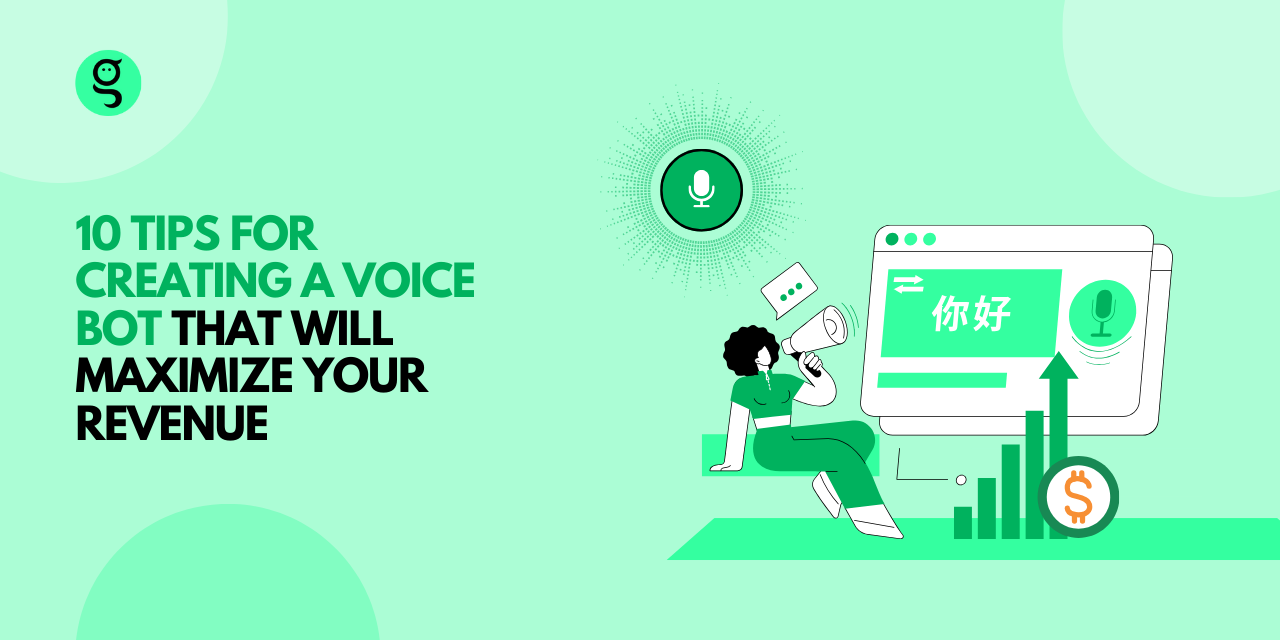Voice bots are taking the world by storm, with an estimated global market value of $15.5 billion by 2028 and a CAGR of 23.3%. But simply creating a voice bot isn’t enough. You need an intelligent automation solution that delivers real value to your customers. This builds trust in your brand and drives higher satisfaction and sales.
So how do you develop a profitable voice bot that takes your business to the next level? Here are 10 expert tips to maximize your voice bot ROI:

#1 Apply the ‘One-Breath’ Response Method:
When crafting your voice bot’s dialogues, shorter is sweeter. Responses should ideally take just one breath for users to grasp. This concise communication keeps conversations clear and focused. Long-winded bot responses only lead to confusion and frustration. Stick to the point to maximize understanding.
#2 Use an Empathetic, Human Tone:
Here’s a thought-provoking question - does your voice bot make users feel heard and understood? An empathetic bot that responds supportively creates pleasant, rewarding conversations. This emotional connection drives greater customer satisfaction. And happy customers convert better and buy more over the long term.
#3 Make Dialogues Feel More Lifelike:
Bots with rigid, robotic responses quickly feel stale to users. Instead, program generative abilities like variability and natural randomness into frequent conversations. This keeps dialogues feeling fresh every time. Adding light humor also makes exchanges more relatable. The more your voice bot emulates human nuances, the greater user comfort and engagement.
#4 Give Control Back to Users:
Sometimes due to a fast response from the voice bot users aren’t able to grasp the complete meaning. And when consumers don’t understand a response or need something simpler repeated, do they feel comfortable taking charge? Build mechanisms for users to pause interactions or explicitly request repetitions without failure messages. This prevents disengagement and maintains open, effective communication.
#5 Define & Track Key Metrics Relentlessly:
How will you quantify your voice bot’s success? Outline precise KPIs for core metrics like query resolution, containment rates, and more. Pay special attention to gauging ROI over time. Does conversation volume translate to revenue? Deep analytics reveal optimization areas to double down on for maximum profitability.
#6 Set Expectations Clearly Upfront:
A quick tip to avoid dissatisfaction - be upfront about your voice bot’s abilities. Clearly outline use cases and limitations during opening interactions so users know what to reasonably expect. This preempts scenarios where customers attempt complex requests your technology can’t yet handle. Transparent expectations make for much smoother bot conversations.
#7 Ask User Feedback Post-Conversation:
Here’s a powerful tool for driving customer satisfaction upward: post-conversation surveys. Brief 3-5 question reviews of users’ call experiences uncover friction points and areas for refinement. This direct input shapes impactful improvements for delighting future customers. And happy customers are lucrative customers.
#8 Ensure Seamless Handoffs When Required:
Despite a robust design, sometimes voice bots will inevitably encounter tricky asks they can’t resolve alone. But does your failover process still feel smooth for users? Bot-to-human handoffs should happen instantaneously when explicitly requested. Or automatically when repeated failures occur. This fallback support keeps users satisfied instead of abandoning interactions altogether.
#9 Conduct Extensive Testing Before Launch:
It’s tempting to rush your voice bot out quickly, but robust testing is crucial. Have you run comprehensive user acceptance tests? This reveals how real customers interact with your bot, highlighting areas that impact user experience. Fixing issues pre-launch vastly improves customer satisfaction down the line, leading to better retention and revenue.
#10 Optimize, Optimize, Optimize:
MVP bots get you to market rapidly but don’t stop there. Set aside ample resources for ongoing training and optimization post-launch. This evolves your voice bot’s capabilities over time. More complex queries get resolved faster without errors or escalations. And the more your bot can handle entirely on its own, the bigger your potential profits.
To Conclude:
To summarize, meticulous testing, constant optimization, concise responses, empathetic tone, natural dialogues, user control, strict metrics, expectation setting, feedback loops, and seamless human handoffs are key to a profitable voice bot.
Want to experience the revenue explosion powered by voice AI firsthand? Request a custom demo from our experts at VoiceGenie to interact with our humanized, multilingual voice bots designed to maximize your ROI across industries. Adopt the right voice automation platform today, and rapidly boost customer satisfaction plus sales.

Comments